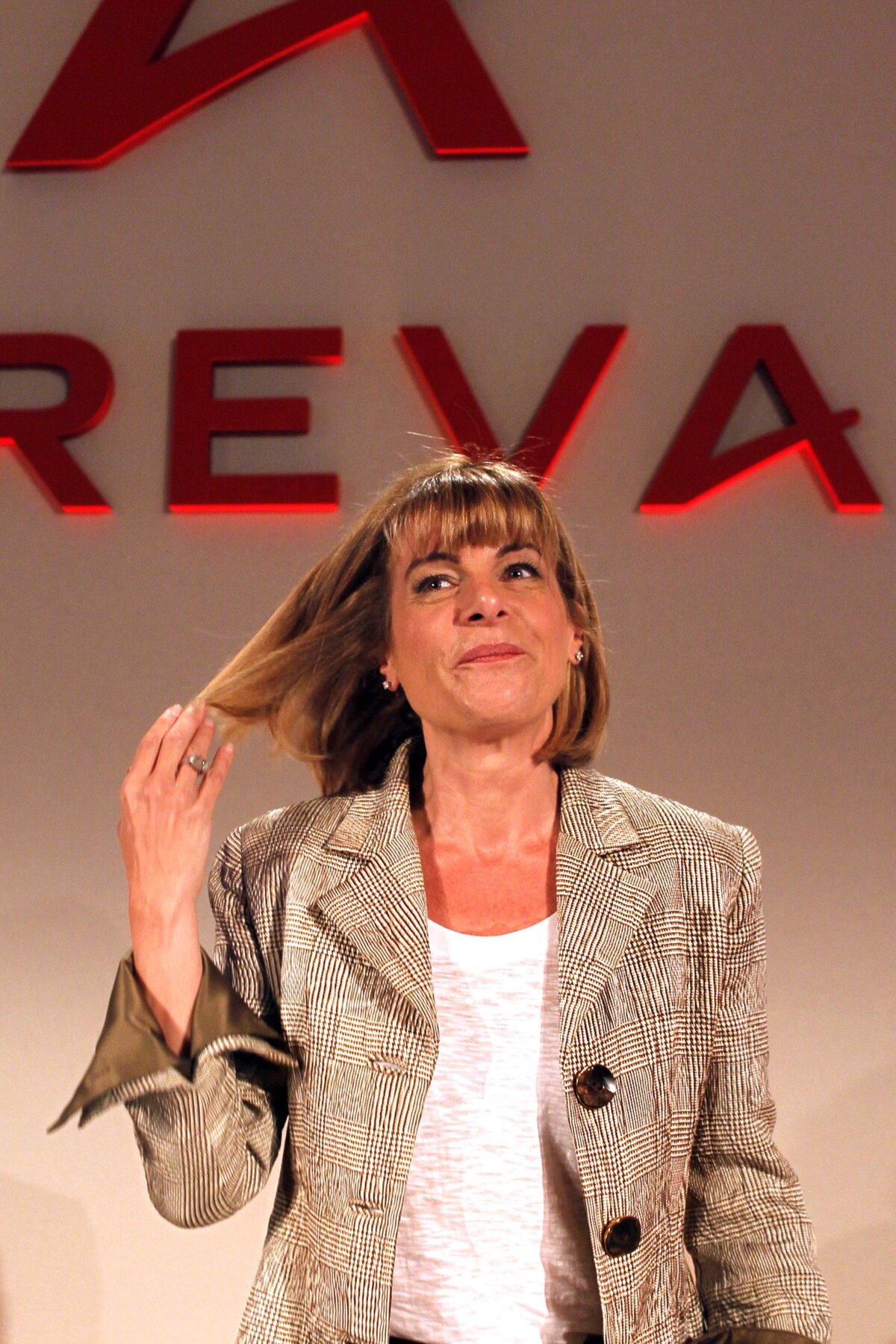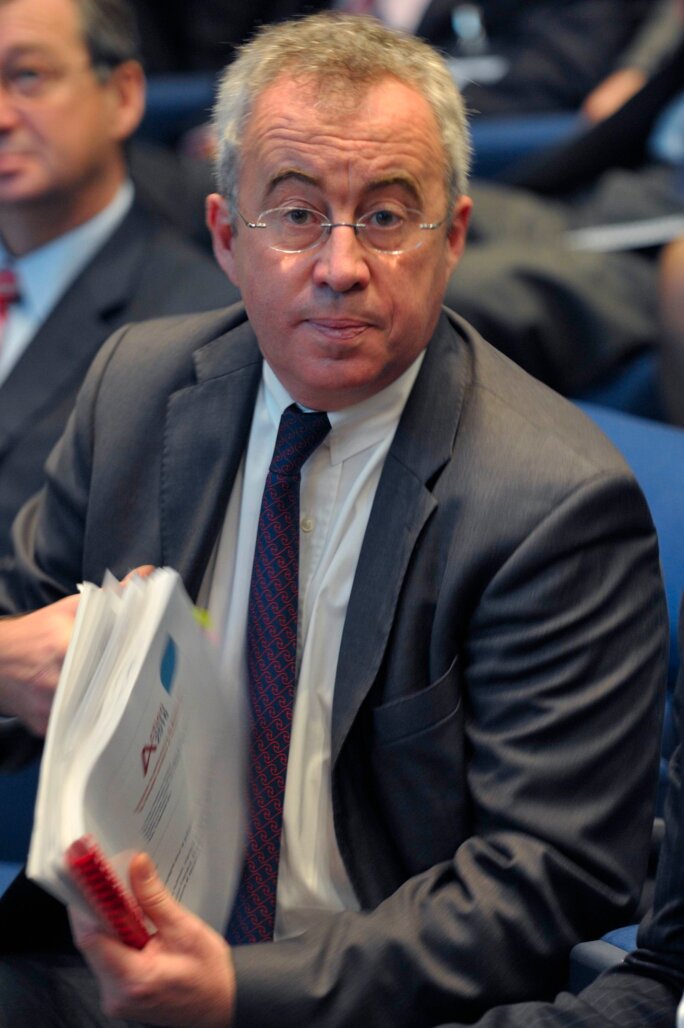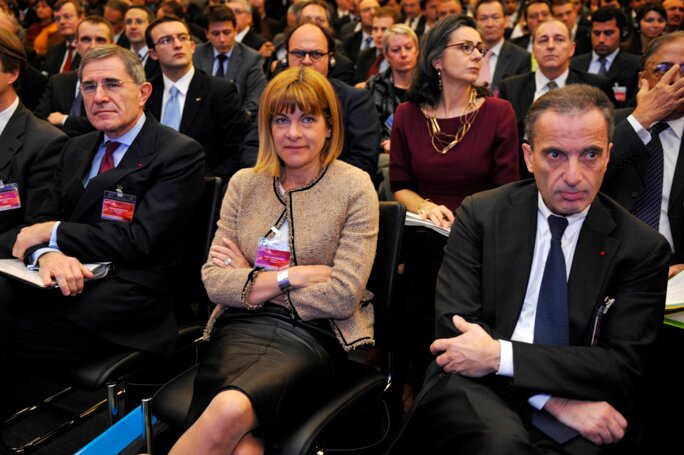When French publicly-owned nuclear giant Areva bought Canadian mining company UraMin in 2007, it boasted of having secured significant uranium deposits in Africa. But five years on, no uranium has ever been mined there, and Areva has had to write off nearly 2 billion euros in its accounts. Here, Martine Orange investigates the fiasco and the attempts to cover up what promises to become a major industrial scandal, along with the intrigue surrounding the company's sacked and furious CEO Anne Lauvergeon.
-------------------------
Areva, the French state-owned nuclear firm, bought UraMin, a Canadian mining company which owned uranium deposits in Africa, amid much fanfare in 2007, paying 2.5 billion dollars, or some 1.8 billion euros.
But last year it had to mark down the value of UraMin’s uranium deposits to the tune of 426 million euros in its 2010 accounts. Then in December, Areva’s new CEO, Luc Oursel, 55, announced that they would be depreciated further, this time by a massive 1.5 billion euros.
Oursel replaced Anne Lauvergeon, who ran Areva for ten years, after the government refused to renew her mandate last June.
Following this latest write-down, UraMin, since re-named Areva Resources Southern Africa, is worth just 400 million euros in Areva’s balance sheet, a little over a fifth of its purchase price. "Areva bought thin air," commented a former executive of the company.

Enlargement : Illustration 1

Besides the disappearance of almost 2 billion euros in write-downs, Areva’s finances are floundering because of costs due to delays in building an EPR, a new design of nuclear reactor, for Finland, and charges for plant closures prompted by safety concerns in the wake of the nuclear disaster at Japan’s Fukushima Daiichi plant last year.
As a result, Areva said on December 12th, it expects to report an operating loss for 2012 of 1.4 billion to 1.6 billion euros.
The cost cuts planned to remedy its losses are to be made after years of lavish spending during which the group already sold the bulk of its non-core assets. Thousands of jobs are on the line and sites could be closed.
The government will have no choice but to play its role as Areva’s main shareholder. An injection of fresh capital of at least a billion euros, perhaps more, seems inevitable – a hefty sum when the government is scrambling to raise cash from sources as diverse as taxing fizzy drinks or cutting benefits for industrial accidents to reduce its gaping budget deficit.
Since Areva’s announcement, business and political circles have been alive with speculation over how the jewel of France’s nuclear industry came to this sorry point. The affair has shades of the Great Oil Sniffer Hoax, in which oil company Elf Aquitaine lost millions in the late 1970s backing a system for detecting oil under the sea which turned out to be a scam. It was covered up by the government of then-President Valéry Giscard d’Estaing.
Lauvergeon, 55, has herself added grist to the mill. Last year she filed a lawsuit alleging violation of professional secrets and infringement of privacy after the investigative weekly Le Canard Enchaîné revealed that she and her husband, Olivier Fric, had been subjected to illegal phone tapping during a private investigation last September of Areva’s UraMin takeover.
She took the hostilities to a new level on January 11th, announcing that she had obtained a fast-track court hearing for February 3rd claiming a 1.5 million euro severance payment, despite the fact that she had said on leaving Areva that she gave up any such claim. The company retorted that any payment would depend on the outcome of inquiries into the purchase of UraMin.
Last month’s announcement of hefty losses finally jolted Areva’s supervisory board into action. A committee of three board members was set up to shed light on the conditions under which UraMin was bought. A parliamentary report on how Areva has been managed, at the initiative of Socialist Party Member of Parliament Marc Goua, is also due to be published at the end of this month.
Depleting uranium
Back in 2007 Lauvergeon described Areva’s purchase of UraMin as "the group’s most significant transaction". It is rare, however, for an acquisition to lead to this level of failure and, in financial terms, destruction of value.
During the internet bubble, certainly, companies rushed to buy up a multitude of small internet-based firms that had practically been created overnight, only to find that they were worth nothing. UraMin is also a story of a speculative bubble, this time in commodities. Areva forked out for UraMin just as uranium prices hit their all-time high, and when the bubble burst, UraMin lost its lustre.
The analogy ends there. Unlike the internet bubble, where speculation concerned intangible assets, a mining company’s assets are tangible, in the form of deposits and reserves. If at first prices are too low to offset production costs and turn a profit on certain deposits, they can always become profitable at a later date. Mining is a highly cyclical business and the industry knows how to wait until an uneconomic deposit becomes profitable.
In the case of uranium, forecast demand has fallen off since the Fukushima accident, as few experts now see bright prospects for nuclear power. But there will nevertheless still be demand for uranium in the future, and uneconomic deposits could once again become profitable to mine.
Unfortunately for Areva, it would seem it does not have the resources it was promised, both in terms of quantity and quality. The company has cut its estimate of reserves at Trekkopje, in Namibia, one of UraMin’s main deposits, by 45%.
UraMin’s former owners had said Trekkopje would become "one of the biggest uranium mines in the world" and would produce at least 8,000 tonnes from 2008. But not a single ounce of uranium ore has been mined there.
Areva now says that potential uranium production at Trekkopje is only 26,000 tonnes against a previous estimate of 46,200 tonnes. Worse still, the ore content is so low and its quality so poor that it is not clear the deposit will ever be economically viable, unless there were a worldwide shortage of uranium.
Evaluations of other UraMin deposits are less catastrophic than at Trekkopje, notably for the South African deposit, but they are hardly reassuring. In any case, Areva has decided to suspend work on bringing them on stream and says they are uneconomical to mine at present.

Enlargement : Illustration 2

Those who defend Lauvergeon’s track record say this series of downward revisions and depreciations is excessive, and that UraMin has much more value than the company is currently suggesting. Speaking anonymously, they allege her successor is using the usual devices of loading all the difficulties onto the accounts for the year preceding his arrival so as to take credit for a strong recovery.
The problem with this is that Oursel was Lauvergeon’s number two, so he is already tainted by the existing track record. Also, UraMin may well be a lasting burden for Areva, not one it can write off in one year’s accounts.
In any case, the matter is so sensitive that it has divided opinions inside Areva since the purchase and seems to have become a secret weighing on the management team.
Numerous doubts began to surface within the group right from the moment UraMin was bought. The acquisition was officially led by Oliver Mallet, Executive Vice President of its mining division at the time.
Yet Mallet hardly called upon the group’s mining specialists, who were already sceptical about the wisdom of making such a purchase at such a time. The mining industry tends to avoid buying up assets when speculation is rife, since the risk of overpaying for a deposit is considered to be too high.
Nor did Areva call upon its own technical experts. The negotiations to buy UraMin were carried out on the basis of expert evaluations and guarantees from the sellers, with no counter-expertise by the group being done either internally or externally. Yet Areva, which has been mining uranium since the 1950s, has considerable knowledge in the matter.
Lauvergeon, set on proving the acquisition was a good move, ordered numerous drilling campaigns, sampling exercises and analyses at a cost of tens of millions of euros. Within the group convictions wavered, and rumours began to circulate outside the company about UraMin being a bad deal.
This was seen by Lauvergeon, who was already fighting to keep her position as CEO, as a campaign orchestrated against her by EDF and its chairman, Henri Proglio, with whom she has a very confrontational relationship. While he may well have helped things along, he was not the only one involved.
Inside the company Lauvergeon also had detractors. From 2008, expert reports and investigations came and went, some carried out with Lauvergeon’s backing and some without her knowledge, as if some people suspected a plot while others appeared to be covering their tracks.
Curious handling of expert reports
This strange atmosphere was due to the results from the initial batch of tests, which were bad. According to our information, a first report from an independent Canadian expert talked about revising down initial resource estimates for UraMin’s deposits by 10% to 15 %.
The question here is whether it is conceivable that the management team could not have known about this first report. In the event, Areva said nothing to its legal advisors, or to its main shareholder, the French government, nor did it mention it in its annual report.
On the contrary, at the time the group was vaunting a strategic partnership with a Chinese firm, the China Guandong Nuclear Power Company, for mining the deposits, although this partnership never came about.
Areva nevertheless maintained its estimate of producing 7,000 tonnes from the deposits as of 2010. That amounts to misleading information in bourse terminology, or flawed accounting.

Enlargement : Illustration 3

In July 2010, as a battle raging between EDF and Areva (1) seemed on the verge of turning into nuclear war, the government demanded an audit at Areva.
It sent in accountant René Ricol, the man used to defuse all the difficult dossiers during the Sarkozy presidency, with a mission to elucidate the group’s accounts and risks. He focused on the building of the EPR in Finland, but also investigated the UraMin acquisition at length.
Two reports of the audit were published: an official one from which any embarrassing or confidential data had been deleted; and an unofficial one that was given to a limited number of people, with numbered copies to avoid any leaks.
Even members of Areva’s supervisory board were not given a copy of the unofficial report. It was read out to them during a board meeting, the official reason being to ensure it was kept completely confidential, a method that precludes careful reflection and makes it hard to formulate critical questions.
This report again raised questions about UraMin. Even though falls in shares and uranium prices had cut the value of its acquisition, this had not been reflected in Areva’s accounts.
The audit also echoed doubts about the quantity and quality of uranium in the deposits Areva had bought. It estimated that 20% of the promised mineral resources were missing, without naming the experts’ reports on which it based this assessment. In the end, Areva’s mining division, valued at 7 billion euros in the company’s accounts, is in reality only worth 4 billion euros, according to the audit.
Lauvergeon and her management team would contest the report’s analysis and the figures, but nothing of this filtered out since the priority was not to tarnish the image of Areva, one of the jewels in the crown of French industry.
The silence became harder to maintain, though, as Areva’s financial situation weakened and the position of CEO Lauvergeon appeared increasingly insecure. At a board meeting during 2010, Sébastien de Montessus, Senior Executive Vice President of Areva’s mining division, was heard to remark: "The chemical analyses from UraMin’s deposits are not good."
At the end of 2010, following some irate discussions, Areva’s management finally accepted taking a provision of 426 million euros for UraMin. And the audit committee demanded that the following paragraphs be included in Areva’s 2010 Reference Document (page 239):
"The results of exploration campaigns carried out to assess the potential of deposits, particularly in South Africa (Rystkuil) and Namibia (Trekkopje) [two UraMin sites], along with changes in economic conditions, are likely to have an impact on resource estimates and consequently on the production levels to be taken into consideration for impairment tests.
"More specifically in the case of Trekkopje, the low correlation level identified between radiometric measurement and uranium content in the ore assessed by chemical measurement creates uncertainty about the deposit’s actual resources and the quantities that might ultimately be produced."
According to information obtained by Mediapart, Jean-Dominique Comolli, director of the Agence des Participations de l’Etat, the agency that manages the French government’s shareholdings, was fed up with being strung along on this critical question and sought an independent expert report to establish the real situation. Comolli did not return Mediapart’s calls for a comment.
-------------------------
1: Feuding between Areva and EDF can be traced to the ending of their obligation to buy from French suppliers, creating competition that took the form of them being on different sides in bidding for key nuclear power plant contracts. There are also numerous interpersonal conflicts and alleged conflicts of interest.
Lies and spies
Over 2010 the atmosphere at Areva worsened. While the audit committee under René Ricol was working on the accounts, another investigation was begun into the conditions of UraMin’s acquisition. This was done without informing Lauvergeon.
According to our information, this latter investigation was commissioned by Areva’s security department on a request from one of the directors of the mining division, apparently with the support of a board member. This is also what Marc Eichinger, head of a Swiss consultancy, Assistance Petroleum International Capital (APIC), told daily Le Parisien on January 13th and Reuters on January 16th.
Eichinger said he had been asked to carry out the investigation by Areva’s Direction de la Patrimoine, the official name for its security department, which had itself received "an internal request". He said he had not been in contact with either Lauvergeon or any member of the management team.
"There is a body of serious corroborating evidence showing that Areva was the victim of a fraud, probably facilitated by accomplices within the group," the report concludes, according to Le Parisien. It also accuses Areva of having "published misleading information" after its purchase of UraMin "right up to the time when it was no longer possible to […] hide" certain facts.
However, Goua, who is writing the report on Areva due out at the end of this month, told Reuters that Eichinger’s report contained no proof of a fraud.
Could Lauvergeon have postponed telling the truth about UraMin if her mandate as CEO had been renewed? The group’s financial situation, what with the problems in Finland and fall-out from Fukushima as well as its uranium write-downs, suggest it would have been hard to maintain the facade much longer. In any case, her departure last summer lifted the veil on the matter.
Last autumn, another investigation was discreetly organised, apparently again at the request of Areva’s mining division. As reported in Le Canard Enchaîné, this included illegal phone-tapping and stalking of Lauvergeon and her husband to see whether they might have illegally had an interest in the UraMin dossier.
The investigation, commissioned from a private Swiss firm, finally turned against those who commissioned it. Lauvergeon was totally exonerated and took out a lawsuit.
"It is unquestionable that this spying operation was in direct relation to Anne Lauvergeon’s professional functions,” said Jean-Pierre Versini-Campinchi, Lauvergeon’s lawyer. “It is obvious that someone was seeking to destabilise her." Lauvergeon herself sees it as another campaign by Proglio, François Roussely, Proglio’s predecessor at EDF, and now Oursel, who all want to see her downfall.
The UraMin affair raises several questions. Why would Lauvergeon have handled a transaction with so little rigour, and in a way that was hardly advantageous for her company? If there were a fraud, why would she have covered it up for so long?
The mystery of the vanished two billion euros is only just beginning to unravel.
-------------------------
English version: Sue Landau
(Editing by Graham Tearse)
The original French version of this article can be found by clicking here.


